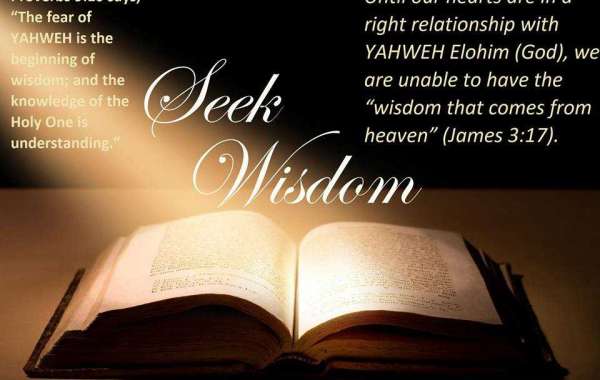Until our hearts are in a right relationship with YAHWEH Elohim (God), we are unable to have the “wisdom that comes from heaven” (James 3:17).
Proverbs 9:10 says, “The fear of YAHWEH is the beginning of wisdom; and the knowledge of the Holy One is understanding.”
Basically, this verse teaches that the fear of YAHWEH is foundational to true wisdom; all other types of learning are worthless unless built upon a knowledge of the MASTER Himself. Many other passages talk about the fear of YAHWEH (e.g., Psalm 111:10; Proverbs 1:7; 14:27; 15:33). Before we can understand how the fear of YAHWEH leads to wisdom, we need to define what the Bible means by “fear” in this context.
In the Bible, the word translated “fear” can mean several things. It can refer to the terror one feels in a frightening situation (Deuteronomy 2:25). It can mean “respect” in the way a servant fears his master and serves him faithfully (Joshua 24:14). Fear can also denote the reverence or awe a person feels in the presence of greatness (Isaiah 6:5). The fear of YAHWEH is a combination of all of these.
Fear of YAHWEH can be defined as “the continual awareness that our loving heavenly Father is watching and evaluating everything we think, say, and do” (Matthew 12:36; Psalm 139:2; Jeremiah 12:3). As Yahshua told each of the seven churches in Revelation 1—2, “I know your works.” Nothing escapes His attention.
To develop the fear of YAHWEH, we must recognize Elohim (God) for who He is. We must glimpse with our spirits the power, might, beauty, and brilliance of YAHWEH the Master Elohim Almighty (Revelation 11:17; Hosea 12:5; Isaiah 6:1–5). Those who fear YAHWEH have a continual awareness of Him, a deep reverence for Him, and sincere commitment to obey Him.
Proverbs 1:7 says, “The fear of YAHWEH is the beginning of knowledge; fools despise wisdom and instruction.” This verse gives us some added insight with its antithetical parallelism—there is a sharp contrast between the wise life and the foolish life. A wise person fears/reverences/obeys the MASTER; a fool despises YAHWEH’S instruction and cannot be told what to do. The wise person is wise because he has started at the starting place; the fool has no foundation on which to build wisdom.
Romans 1:21–22 speaks of those who “neither glorified him as ELOHIM nor gave thanks to Him, but their thinking became futile and their foolish hearts were darkened. Although they claimed to be wise, they became fools.” This is a description of people who try to obtain wisdom while ignoring YAHWEH—it cannot be done for the simple reason that YAHWEH is the source of wisdom.
The link between the fear of YAHWEH and wisdom means we cannot possess wisdom if we recreate YAHWEH in our own image. Too many people want to “tame” YAHWEH into a non-threatening nobody. But, if we redefine YAHWEH as a god that makes us feel comfortable, a permissive “buddy” who exists simply to bless us and give us what we want, we will not fear Him in the way He deserves to be feared. YAHWEH the MASTER Almighty is far greater than that, and the fear of YAHWEH begins when we see Him in His majesty and power (Revelation 4:11; Job 42:1–2) YAHWEH shows Job (and us) a glimpse of His power in Job 38—41 when He describes His absolute sovereignty over everything.
When the reality of YAHWEH’S true nature has caused us to fall down in worship, we are then in the right position to gain wisdom. Wisdom is merely seeing life from YAHWEH’S perspective and responding accordingly. Wisdom is a priority, and we are told to seek it above all else (Proverbs 3:13; 16:16). Proverbs is known as the wisdom book, and the entire second chapter gives a detailed explanation of the value of gaining wisdom.
Until our hearts are in a right relationship with YAHWEH, we are unable to have the “wisdom that comes from heaven” (James 3:17). Without the fear of YAHWEH, we may gain knowledge of earthly things and make some practical choices for this life, but we are missing the one ingredient that defines a wise person (Psalm 14:1; Exodus 20:3; 34:14; Jeremiah 25:6; Matthew 22:37). In the parable of the rich farmer, the rich man had a “wise” and practical plan for his profits, but YAHWEH Elohim said to him, “You fool!” because the farmer’s plans were made with no thought of YAHWEH Elohim and eternity (Luke 12:16–21).
Without the fear of YAHWEH, the MASTER, we make final decisions based on our faulty human understanding (Proverbs 3:5–6). When we incorporate the fear of YAHWEH into every moment of our lives, we make decisions based upon His approval. We live with the knowledge that the Creator of the universe is intimately involved in our every move. He sees, knows, and evaluates all our choices, and we will answer to Him (Psalm 139:1–4).
Our respect for YAHWEH’S majesty causes us to honor Him (Psalm 29:2). Our gratitude for His mercy causes us to serve Him well (Psalm 2:11; 107:15). And the understanding that our ELOHIM (God) of love is also a ELOHIM of wrath inspires enough fear to help us stay away from evil (Romans 1:18; Proverbs 8:13). Sin is foolish; righteousness is wise. When we live righteously, we are on the path to wisdom, and everyone in our lives benefits (Proverbs 13:20; 19:8).







